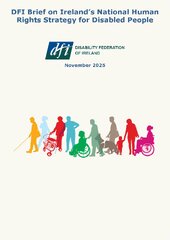DFI Brief on Ireland’s National Human Rights Strategy: Plain English version
Issued on November 6 2025
Ireland’s first National Human Rights Strategy for Disabled People was launched in September 2025, marking a major step forward since Ireland ratified the UN CRPD in 2018.
The Strategy was shaped through extensive consultation with disabled people, Disabled Persons’ Organisations, DPOs, and disability support organisations, including DFI members. It takes a human rights-based approach, recognising disabled people as rights-holders and calling for a whole-of-government response.
We've developed a plain English summary and brief on the Strategy.
Key Commitments
The Strategy is built around five pillars, with 123 actions in total:
Inclusive Learning and Education
Focuses on inclusion across all levels of education and better recognition of Irish Sign Language (ISL). DFI warns that continued investment in special schools and classes contradicts Ireland’s commitment to inclusive education under the UN CRPD.Employment
Aims to improve access to work for disabled people. Promises to review the Disability Allowance are welcome, but DFI notes weaker commitments than in previous strategies and calls for clear targets to close Ireland’s wide disability employment gap.Independent Living and Community Participation
Includes 36 actions to support personal independence and participation. DFI welcomes recognition of disability services as part of independent living, but flags the lack of clear targets on deinstitutionalisation, accessible housing, and supports for young disabled people in nursing homes.
The appointment of Access and Inclusion Officers in every local authority is a major positive.Health and Wellbeing
Commits to improving access and equality across health services, with a stronger focus on disability equality training and Universal Design. DFI highlights the absence of actions on disabled women’s health and rare diseases.Transport and Mobility
Supports better access through Universal Design and a “whole-of-journey” approach. Expansion of Local Link and a new Vehicle Adaptation Scheme are welcome, but the continued delay in reforming the Mobility Allowance remains a concern.
What’s Missing
DFI points to several gaps:
No reference to key UN CRPD articles (e.g. equality, access to justice, participation in political life).
No commitment to reduce disability poverty, despite high rates.
No legal right to independent advocacy.
Weak actions on intersectionality, gender-based violence, and the Cost of Disability.
No mention of Artificial Intelligence, which could impact inclusion.
Implementation and Monitoring
The Government will publish two-year Programme Plans of Action to deliver and measure progress. Three Strategic Focus Networks will be established on:
Digital and Assistive Technology
Cost of Disability
Intersectionality
Monitoring will involve the Cabinet, Oireachtas, a Delivery and Monitoring Committee, and an Annual Forum for stakeholders and DPOs.
DFI’s Role
We will continue to work with government and partners to ensure the Strategy delivers real change.
We will monitor progress, share evidence from members, and advocate for stronger leadership, accountability, funding, and genuine inclusion across all government actions.

